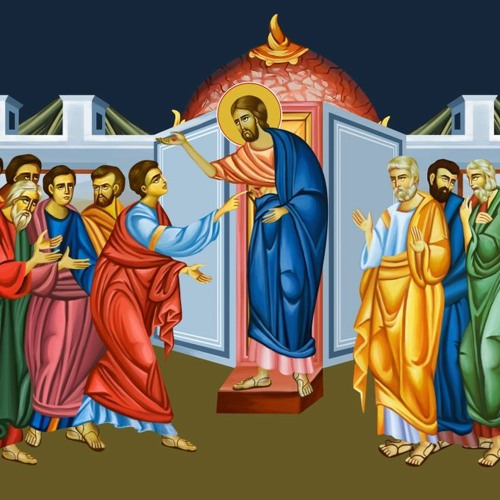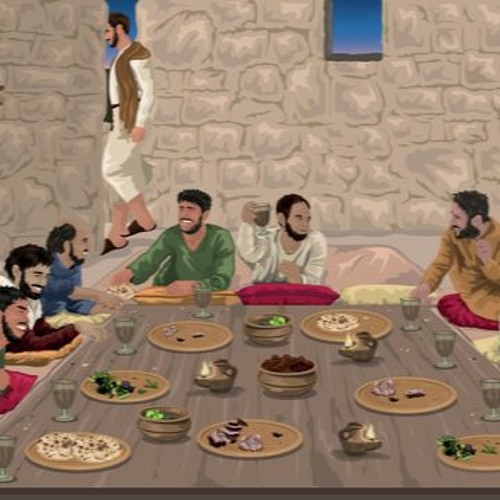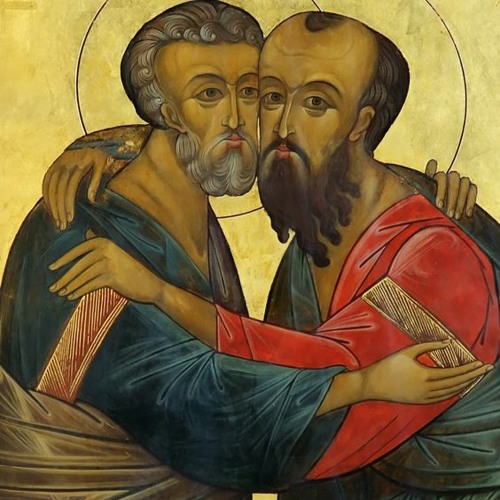Fourteenth Sunday in Ordinary Time. Year B - Sunday, July 4, 2021
(EPISODE: 309)
Readings for Fourteenth Sunday in Ordinary Time. Year B
FIRST READING: Ezek 2: 2-5
Ps 123: 1-2a, 2bc, 3-4. "Our eyes are fixed on the Lord, pleading for his mercy. "
SECOND READING: 2 Cor 12: 7-10
GOSPEL ACCLAMATION (cf. Luke 4: 18). Alleluia, alleluia! The Spirit of the Lord is upon me; he sent me to bring the Good news to the poor. Alleluia!
GOSPEL: Mark 6: 1-6
Shutterstock licensed image ID: Replica Synagogue in Nazareth 1437909230. An example of an ancient synagogue in Nazareth. By David McIntosh-
++++
Please listen to the audio recordings of the Mass – (Readings, prayers and homily), for Fourteenth Sunday in Ordinary Time. Year B - Sunday, July 4, 2021, by clicking this link here: https://soundcloud.com/user-633212303/faith-hope-and-love-ordinary-14b-episode-309
(EPISODE:309)
+++++
* (Prologue: Fr Paul Kelly)
In Australia, this is also, (Annually on the first Sunday in July), when Catholics come together across Australia to acknowledge and celebrate the gifts of Australia's First peoples. – Aboriginal and Torres Strait Islanders Sunday - \
This year is particularly important following the COVID 19 Pandemic and its impact on the ways in which we interacted and made contact with one another. The NAIDOC theme for 2021 is = "Heal Country." Today our world is in need of healing – environmentally, spiritually and socially. We must all come together as a global community to fight the injustices of inequality, racism and environmental damage.
Today's Gospel is very fitting because Mark tells us of Jesus returning to his 'native place' – Nazareth – to a non-accepting, hostile reaction. Jesus had been welcomed and revered in other places, why is it that he is mocked and disregarded in his own home? "Is he not the carpenter?" the crowd called because they saw him as "without honour" and were unable to believe in him. He did not fit into their ideological view and thus did not deserve respect in their eyes. In Australia, our own First Nations people have suffered a similar reception to Jesus in Nazareth. Their knowledge and complex cultural systems, created and honed over millennia, have been often overlooked and dismissed as primitive and irrelevant, to our fast-paced world of today. This could not be further from the truth, particularly as we become more aware of their continued care, love, and respect for 'country', grounded in a relationship with the Creator, God, - this relationship was formed independently of Western influence.
2021 marks the 250th Anniversary of the arrival of Christianity in Australia. Yet the Spirit of God was poured out onto the original inhabitants of this great Southern Land many, many thousands of years prior. God's Spirit could be heard through nature which God created with love – which bears God's imprint - God's Spirit could be and still can be heard, through the singing of the birds, the cascade of the waterfall, the rustle of the wind and, most importantly, in silence.
Miriam-Rose Ungunmerr-Baumann, a respected Ngangiwumirr Elder, artist and 2021 Senior Australian of the year explains the importance of listening and understanding the silence: "My people today, recognise and experience in this quietness, the great Life-Giving Spirit, the Father of us all. It is easy for me to experience God's presence. When I am out hunting, when I am in the bush, among the trees, on a hill or by a billabong; these are the times when I can simply be in God's presence. My people have been so aware of Nature. It is natural that we will feel close to the Creator."
Aboriginal and Torres Strait Islander peoples are inextricably connected to the country in Australia and its waters. This connection to the country and all of God's creation is core to their spirituality as a people and that of their ancestors. The term itself – Country – encompasses far more than the physical land. "For us, Country is a word for all the values, places, resources, stories and cultural obligations associated with that area and its features. It describes the entirety of our ancestral domains," explains Professor Mick Dodson.
Deacon Boniface Perdjert, who was both Australia's first permanent Deacon and first Aboriginal Deacon clearly expressed the translational role that 'country' or nature plays in bringing together Aboriginal and Torres Strait Islander Culture and Catholic faith: "We like the way (Jesus) uses the things of nature to teach, and the important part nature plays in the Sacraments"
Let us move forwards as a united people in Christ, committed to embracing the gifts of Aboriginal and Torres Strait Islander knowledge to not only Heal Country, but to Heal our relationships with one another, and in doing so our creators' gifts to us all – the gift of this beautiful world.
Source: http://natsicc.org.au/assets/natsicc-a4-booklet_final_reduced_spreads.pdf
also: https://www.natsicc.org.au/2021-atsi-sunday.html
++++++++
(Homily: Fr Peter Dillon).
Homily 14th Sunday Ordinary Time Year B 2021
Throughout the gospels we seem to be constantly looking for indications of Jesus' divinity. It would seem over time that we have come to accept that he is the Son of God, but we do, from time to time, have trouble accepting that he is fully human. We are often amazed at his patience, his commitment, his acceptance and his compassion, believing perhaps that he was given 'super powers' to cope with the daily issues that give most of us our frustrations and burdens. If he was gifted with abilities beyond those that we might find present in our own lives, then we could be forgiven for thinking living a Christ-like life is beyond us.
It is one of the characteristics of Mark's gospel accounts that he does focus on the humanity of Jesus, such that for many centuries he was not given great credibility, since it was thought that he was trying to diminish the divine authority of Christ. Fortunately, the unique character of Mark's writings came to been seen for their enormous contribution to the balance of Jesus' nature - Truly God and truly human. He encouraged us to believe that we can be like Christ, humble and strong, gentle and strong, truthful and compassionate, with no powers other than those given us through our Baptism.
So we arrive at this episode when Jesus returns to his home place of Nazareth. This is not a social visit: like other towns in Galilee, he is here on a special mission, to teach in the synagogue, at which many of the townspeople are amazed at what he had to say. But instead of listening to the insight of what he said, they want to know where he received this knowledge. It is clearly difficult for them to face the truth of what he is saying, so if they can discredit him then his wisdom will not disturb their comfortable belief system.
Irrelevant issues are brought to the centre of attention, with neighbours supporting each other in a chorus of distraction. Issues like the job Jesus worked at, their familiarity with his family. They couldn't believe that the man they knew as the carpenter's son was now this font of knowledge. For them, the sheer ordinariness of Jesus cancelled out his new wisdom and works.
Jesus experience of this rejection in Nazareth renders him powerless to do any miracle among his own people. His people lack trust, and this limits his ministry and he is profoundly affected by the way that his people treat him.
This is a sad and familiar story when a prophet is not accepted in their own country. Often we fail to acknowledge the gifts and talents of those who are close to us, in our own house or our community of friends. It's as though familiarity breeds blindness to their contribution to our life and the life of others. We don't give them a chance, or worse, we put them down or belittle them. We have all experienced a little of this, wanting to help but meeting rejection. For some, this is all too painful and they give up on trying to help or care anymore. It's too painful.
Fortunately, Jesus does not give up, but he recognises that Nazareth is not a place where his message will be welcomed. He didn't become embittered. He did what little he could and then he moved on and take his light and gifts elsewhere.
It is important for us all to know that sometimes our best intention to assist may not be appreciated nor should they be forced upon others. For a range of reasons, others may not have the right disposition to receive us. With some courage and self-respect, we should move on to the place or people who are ready, who need what we might have to offer, as long as we do not take our hurt and rejection with us.
Like Paul, this could be the weakness that we turn into a strength, the "thorn" that makes us rely even more on the power of God, the experience that will become the source of growth and strength.
+++++
References:
Homily – Fr Peter Dillon
Prologue - Fr Paul W. Kelly
NATSICC BOOKLET RESOURCE 2021 - http://natsicc.org.au/assets/natsicc-a4-booklet_final_reduced_spreads.pdf
also: https://www.natsicc.org.au/2021-atsi-sunday.html
{Shutterstock licensed image ID: Replica Synagogue in Nazareth 1437909230. An example of an ancient synagogue in Nazareth. By David McIntosh- }
Fourteenth Sunday in Ordinary Time. Year B (Sunday, July 4, 2021) (EPISODE: 309 )
The grace of our Lord Jesus Christ, and the love of God, and the communion of the Holy Spirit be with you all.
+++++++++++++
{{May Our Lord's gift of dignity and community enliven you. }} welcome everyone, we gather - Reflect upon the Holy Scriptures and the values of the Lord.
Coming together as brothers and sisters in Christ, let us pause and reflect upon our sins, in order to celebrate the Holy Eucharist.
Lord Jesus, you are the image of the unseen God: Lord, have mercy.//You are the firstborn of all creation: Christ, have mercy//You are the head of the body, the Church: Lord, have mercy//
May almighty God have mercy on us, forgive us our sins, and bring us to everlasting life. Amen.
+++++++++++++++++++++
Memorial Acclamation
2. When we eat this Bread and drink this Cup, we proclaim your Death, O Lord, until you come again.
++++++++++++++++++++++++++
Ps 123: 1-2a, 2bc, 3-4. "Our eyes are fixed on the Lord, pleading for his mercy. "
GOSPEL ACCLAMATION (cf. Luke 4: 18). Alleluia, alleluia! The Spirit of the Lord is upon me; he sent me to bring the Good news to the poor. Alleluia!
++++++++++++++++
PREFACE: 4
EP II
(theme variation: 2 )
++++
{Thank you for giving generously of your time and prayer.}
go and announce the gospel of the lord
++++++++
Archive of homilies and reflections: http://homilycatholic.blogspot.com.au
To contact Fr. Paul, please email: paulwkelly68@gmail.com
To listen to our weekly homily audio podcast, please click this link here: https://soundcloud.com/user-633212303/tracks
You are welcome to subscribe to Fr Paul's homily mail-out by sending an email to this address: paulkellyreflections+subscribe@googlegroups.com
Further information relating to the audio productions linked to this Blog:
"Faith, Hope and Love - Christian worship and reflection" - Led by Rev Paul Kelly
Prayers and chants — Roman Missal, 3rd edition, © 2010, The International Commission on English in the liturgy. (ICEL)
Scriptures - New Revised Standard Version: © 1989, and 2009 by the NCC-USA. (National Council of Churches of Christ - USA)
"The Psalms" ©1963, 2009, The Grail - Collins publishers.
Prayers of the Faithful - " Together we pray" by Robert Borg'. E.J. Dwyer, Publishers, (1993) . (Sydney Australia).
Sung "Mass In Honour of St. Ralph Sherwin" - By Jeffrey M. Ostrowski. The Gloria, Copyright © 2011 ccwatershed.org.
- "Faith, Hope and Love" theme hymn - in memory of William John (Bill) Kelly (1942-2017) - Inspired by 1 Corinthians 13:1-13. Music by Paul W. Kelly. Arranged and sung, with additional lyrics by Stefan Kelk. 2019.
"Quiet Time." Instrumental Reflection music. Written by Paul W Kelly. 1988, 2007. & This arrangement: Stefan Kelk, 2020.
- "Today I Arise" - For Trisha J Kelly. Original words and music by Paul W. Kelly. Inspired by St Patrick's Prayer. Arranged and sung, with additional lyrics by Stefan Kelk. 2019.
[ Production - KER - 2021]
May God bless and keep you.
+++++++++++++++++++++++++++++







